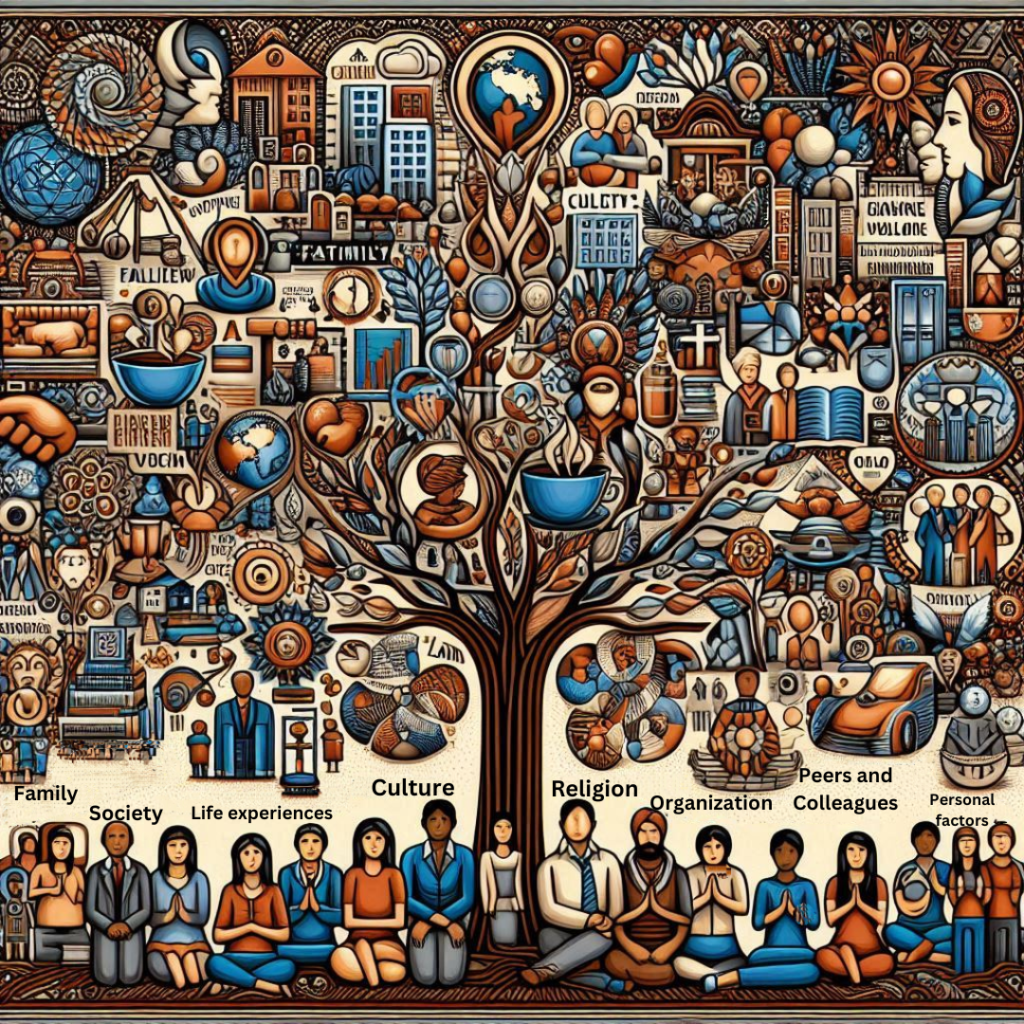Meaning and Sources of Values in Organizational behavior
Values are personal beliefs that guide our actions and decisions. Values help us determine what is right and what is wrong. We usually learn our values from our family and culture, and we often assume that these values are correct because they are shared by the people around us.
Table of Contents

Meaning of Values
Values are the personal beliefs that you hold, that motivate and guide your actions. They help us act according to what we consider to be right and wrong. Our values, as social beings, are what we learn from our family and culture. So, we learn our values from our family and culture, and we think our values are correct because they are learned by the people around us. People also tend to believe that those values are “right” because they are the values of their particular culture.
Example: if someone values honesty, he will deal with truthful with others. This principle will guide his choices at specific times, such as admitting his mistake made during the work process instead of hiding it.
Sources of Values
Values are shaped by many things we experience throughout our lives. Below, I have provided a more explicit illustrative outline of the various elements contribute to our values and respective examples for each:
1. Values from Family
Family tends to be the primary and most influential source of values. We start observing and learning from our childhood by watching our parents, brothers/sisters/relatives. Family members teach us through direct instruction, storytelling, and everyday interactions. They also give us our first sense of right and wrong, and these early lessons often stay with us throughout our lives.
Example: A child who hears his parents say that lying is wrong and they show honesty in their actions will consider honesty as an important part of their life. For instance, they may be taught that stealing is wrong, while you should always tell the truth, even if it is difficult to tell the truth.
2. Values from Society
Community-driven values, come from the society we live in. community or society in which we live also shapes our values. Much of what is acceptable or unacceptable behavior comes from social norms and expectations. The collective beliefs and behaviors of the people around us shape our understanding, Societal expectations can reinforce values through positive reinforcement and social approval, as well as negative consequences and disapproval.
Example: A city where people care about lives on Earth will have community programs and campaigns that encourage more recycling, reducing waste, etc. In this society, people will value their environment and pay attention to what is best for the Earth in the way they live.
3. Values from Life experiences
Personal experiences, both positive and negative, can significantly influence our values. These experiences can teach us lessons and shape our beliefs. Personal experiences, especially importance’s ones, shape our values. Good experiences can strengthen our existing values or create new ones, while bad experiences can change or challenge our values. These experiences teach us which behaviors lead to good or bad outcomes.
Example: A person who has felt the sting of betrayal from someone he loves, trusts with all his heart but that trust is broken, will be more cautious in future relationships and value honesty above all else. Similarly, a person who experiences or receive the kindness from strangers during their tough times may develop a strong value of compassion and help other.
4. Values from Culture
Culture is a shared set of customs, traditions, and beliefs that shape our values. Cultural practices and rituals help reinforce these values and pass them on to future generations. Culture influences our sense of identity and belonging, and the values it promotes are often deeply in-built. Culture background, Tradition, customs and shared beliefs play an important part in defining our values. A culture provides a framework for what is considered important and meaningful.
Example: A culture that promotes one togetherness through collective celebrations, so an individual is bound to have values of community and cooperation village Also help tune into the culture by being a part of cultural festivals that helps develop a sense of belonging and respect towards their heritage.
5. Values from Religion
Religion provides us a moral and ethical sense of how we should behave and take decisions. Values also comes from religious teaching and practice that inculcate from whom they follow. Religious teachings often address questions about right and wrong, the meaning of life, and our responsibilities to others. Religious communities also provide a sense of belonging and shared purpose, reinforcing these values through community activities and rituals.
Example: most religions stress values to give compassion, humility and forgiveness. From attending religious services and participating in the religious education a child learns these values deeply. Another example would be, prayer in a school integrates faith and origin of religious beliefs.
6. Values from Organization
Organizations, including schools, workplaces, and clubs, have their own rules and cultures that influence the values of their members. These institutions promote values through policies, codes of conduct, and the behavior of leaders and peers. Organizational culture can influence individual behavior by setting expectations and providing incentives to adhere to certain values.
Example: If you work at a job where being even five minutes late means you are supposed to pay fines, there are chances that you start developing an appreciation for the importance to punctuality and reliability. This organizational rule can shape their behavior to prioritize arriving on time and meeting deadlines.
7. Values from Peers and Colleagues
Friends, classmate and peers play an important role in shaping our values through social interactions and shared experiences. Peer influence can be particularly strong during adolescence, but it continues to influence us throughout our lives. We often adopt values that help us fit into our peer group and gain their approval.
Example: If a person is part of a peer group that values academic achievement and hard work, they are likely to adopt these values themselves. Seeing friends who study diligently and get good grades can inspire a person to value education and perseverance.
8. Values from Personal factors
Personal reflection, observations, and inner beliefs help individuals develop their own values. This process can be influenced by introspection and a desire to align one’s actions with personal beliefs. Personal factors include our innate personality traits, the way we interpret our experiences, and our individual moral reasoning. This process is ongoing and evolves as we encounter new situations and gain more understanding.
Example: A person who grows up witnessing injustices such as discrimination or inequality may develop a strong value for fairness and justice. Their personal experiences and observations may inspire them to advocate for equal rights and to treat others with respect and fairness.
Frequently Asked Questions About Values in Organizational behavior
What are values?
Where do values come from?
How does family influence our values?
How does society shape our values?
Can personal experiences change our values?
How does culture influence our values?
What role does religion play in shaping values?
How do organizations influence our values?
How do peers and co-workers influence our values?
What are personal factors in the development of values?
Why is it important to understand the sources of our values?
Conclusion of Values in Organizational behavior
Our values come from different sources, such as family, society, personal experiences, culture, religion, organizations, peers, and personal reflection. Each of these sources plays an important role in determining who we are and what we believe. By understanding where our values come from, we can better understand why we act the way we do and can respect the diverse values of others.








Your article helped me a lot, is there any more related content? Thanks!